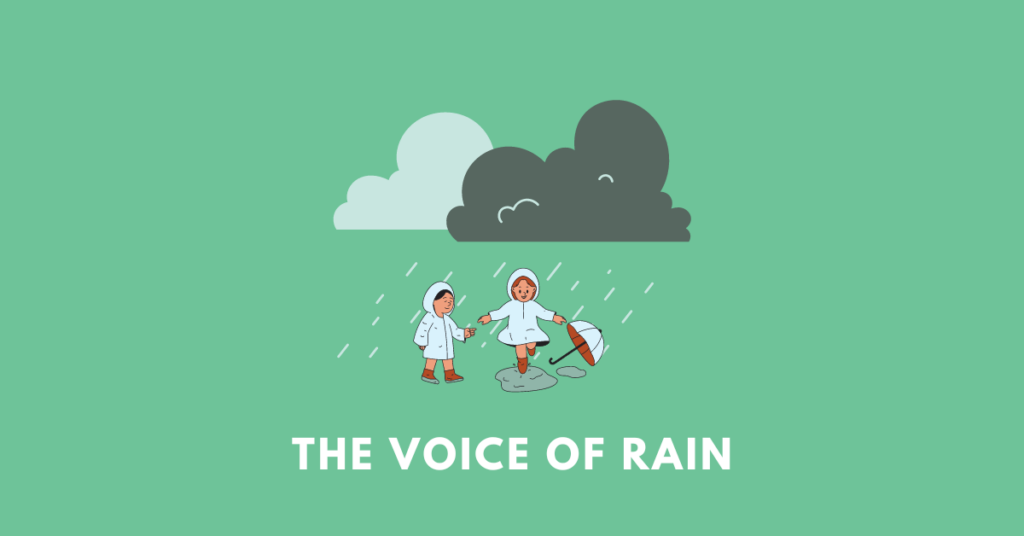Get here the summary, questions, answers, textbook solutions, extras, and pdf of the poem (Chapter 4) “The Voice of Rain” by Walt Whitman of the Assam Board (AHSEC / SEBA) Class 11 (first year) English (Hornbill) textbook. However, the given notes/solutions should only be used for references and should be modified/changed according to needs.

Summary: An answer comes to the poet’s question about the identity of the gently falling shower, and to his utter surprise, the poet translates the answer for the readers.
According to the rain, she is Earth’s most poetic creation. She has no visible form or shape, so she is able to rise eternally out of the ground, the vast oceans, and into the sky without being noticed. To the naked eye, it appears quite different from its earthly source, but its essence remains the same. Then it begins to rain, and the water drops wash and bathe the dry land, removing the dust and impurities. They were dormant and unborn seeds until the raindrops touched them, and now they sprout and grow. After evaporating from the dry ground, the rain restores the earth to a state of vitality. The clean, beautiful earth is a result of the recent rains. She showers her birthplace with blessings of renewed vitality at all hours of the day and night.
The rain’s song is the unending cycle of her love-filled sojourns between the earth and the sky.

Think it out.
1.There are two voices in the poem. Whom do they belong to? Which lines indicate this?
Answer: It’s a poem told from two perspectives. The poet addressing us has one. The poet also hears the voice of the rain. The first line of the poem, “And who art thou? said I to the soft-falling shower,” establishes the poet’s point of view. The second voice, the rain’s, is indicated in the third line of the poem: “I am the Poem of Earth, said the voice of the rain.”
2. What does the phrase “strange to tell” mean?
Answer: The unexpected response of the rain is hard to describe, so the poet uses the phrase “Strange to tell” to indicate this. The intangible quality of the voice was felt deeply but is difficult to put into words.
3. There is a parallel drawn between rain and music. Which words indicate this? Explain the similarity between the two.
Answer: Poem, “soft-falling shower,” “voice of the rain,” and “song” are all terms that are used to describe rain, all of which suggest a connection to music. Rain sings of itself as a lyrical composition of the earth, complete with its own unique melody. The ‘soft-falling shower’ has a musical rhythm to ease and comfort all life on Earth. The poet’s feelings are moved by the “voice of the rain,” which he identifies as the “song” of the planet. The song’s origin is the earth, but it travels far and wide before returning with a message of love for the planet and all its inhabitants.
4. How is the cyclic movement of rain brought out in the poem? Compare it with what you have learnt in science.
Answer: The poet accurately captures the scientific reality of rain’s cyclical nature. She comes up from the ground and the ocean as a cloud of mist (impalpable). She cools off in the air, morphs into a cloud (albeit a vaguely formed one), and returns as rain to the same spot from which it came. With this, both the scientific and poetic cycles are closed.
5. Why are the last two lines put within brackets?
Answer: The last two lines are not part of the rain’s voice, but the poet’s reflection on the sound of rain, so they’ve been set off by brackets. The poet compares the sound of rain to music, calling it “the song of the earth.” Whether or not it is acknowledged, the rain always makes its way back to its source after it has done its work.
6. List the pairs of opposites found in the poem.
Answer: The poem contains many contrasting elements, including:
(i) rise and descend
(ii) lave and drought
(iii) day and night
(iv) Upward to heaven and the bottomless sea
Additional/extra questions and answers/solutions
1. What is the significance of the poem’s title “Voice of the Rain”?
Answer: The poet’s personal experience with the rain serves as inspiration for this poem. The poet gives us a translation of what the rain says about itself, so the poem’s title is quite appropriate.
6. Why does the rain refer to itself as “the Poem of Earth”?
Answer: Earth’s natural splendour would be lost without rain. It gives the dry land a renewed sense of vitality. There is rejoicing in nature as the seeds grow into saplings. It heralds the arrival of life and beauty, making it similar to the earth’s lyrical composition.
Get notes of other chapters and subjects